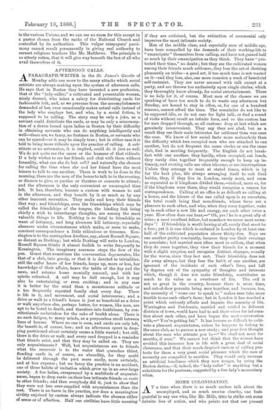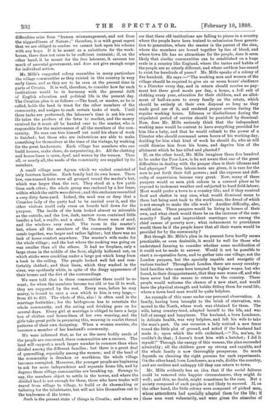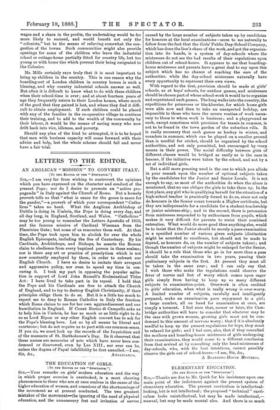HOME COLONISATION.
AT a time when there is so much useless talk about the unemployed, and so much unwise charity, one feels grateful to any one who, like Mr. Mills, tries to strike out some definite line of action, and who points out that our present difficulties arise from "human mismanagement, and not from the niggardliness of Nature ;" therefore, it is with great regret that we are obliged to confess we cannot look upon his scheme with any hope. If it be meant as a substitute for the work- house, there does not seem to be sufficient restraint ; if, on the other hand, it be meant for the free labourer, it savours too ,much of parental government, and does not give enough scope for individual action. difficulties arise from "human mismanagement, and not from the niggardliness of Nature ;" therefore, it is with great regret that we are obliged to confess we cannot look upon his scheme with any hope. If it be meant as a substitute for the work- house, there does not seem to be sufficient restraint ; if, on the other hand, it be meant for the free labourer, it savours too ,much of parental government, and does not give enough scope for individual action.
Mr. Mills's suggested colony resembles in many particulars the village communities as they existed in this country in very -early times, and as they are to be seen at the present time in Tarts of Croatia. It is well, therefore, to consider bow far such institutions would be in harmony with the general drift of English education and political life in the present day. The Croatian plan is as follows :—The head, or master, as he is -called, holds the land in trust for the other members of the community, and assigns to each certain tasks of work. Until these tasks are performed, the labourer's time is not his own. He takes the produce of the farm to market, and the money received for it must all be handed over to the master, who is responsible for the maintenance of all the members of the com- munity. No man can hire himself out until his share of work is finished ; but those who are industrious are able to make something for themselves at the time of the vintage, by working for the great landowners. Each village has members who can build houses, make shoes, do carpentering, &c. All the clothing and house-linen is spun, dyed. and woven by the women. Thus all, or nearly all, the needs of the community are supplied by its members.
A small village near Agram which we visited consisted of only fourteen families. Each family had its own house. These low, one-roomed huts were all grouped round the master's hut, which was larger than the rest. They stood at a few yards from each other ; the whole group was enclosed by a low fence, within which the cattle were driven ; and this enclosure resembled a very dirty farm-yard. Indeed, the mud was so deep that a Croatian lady of the party had to be carried over it, and the other visitors could only cross on boards laid down for the purpose. The inside of the hats looked almost as miserable as the outside, and the low, dark, narrow room contained little besides a bed, a cradle, and a stool. The floors were of mud, and the windows very small. The room in the master's hut, where all the members of the community have their meals together, was larger and rather lighter ; bat there was no look of home comfort anywhere. The master's wife cooks for the whole village ; and the but where the cooking was going on was smaller than all the others. It had no fireplace, only a large stone in the middle of the floor, slightly hollowed out, on which sticks were crackling under a large pot which hang from a hook in the ceiling. The people looked well fed and com- fortably clothed ; and their linen, which they washed in the river, was spotlessly white, in spite of the dingy appearance of -their homes and the dirt of the surroundings.
We were told that in these communities there could be no want; for when the members become too old or too ill to work, they are supported by the rest. Every man, before he may marry, is bound to save a sum which to him is very large,— from £8 to £20. The whole of this, alas ! is often used in the marriage festivities ; for the bridegroom has to entertain the whole community, and the eating and drinking goes on for several days. Every girl at marriage is obliged to have a large 'box of clothes and house-linen of her own weaving, and the -girls take great pride in preparing this, weaving in scarlet thread patterns of their own designing. When a woman marries, she becomes a member of her husband's community.
We were informed that, as far as the mere bodily needs of the people are concerned, these communities are a success. The land will support a much larger number in common than when .divided among the different families ; but there is a great deal of quarrelling, especially among the women; and if the head of the community is drunken or worthless, the whole village becomes corrupted. Moreover, the younger people are beginning to ask for more independence and separate home life, and by degrees these village communities are breaking up. Strange to say, the members object to settle in the towns, and where the divided land is not enough for them, those who have trades will travel from village to village, to build or do shoemaking or tailoring for the inhabitants, but will not hire themselves out to the tradesmen of the towns.
.Such is the present state of things in Croatia ; and when we see that these old institutions are falling to pieces in a country where the people have been trained to submission from genera- tion to generation, where the master is the parent of the clan, where the members are bound together by ties of blood, and where town life has no attractions for the people, does it seem likely that similar communities can be established on a huge scale in a country like England, where the tastes and habits of the people are so utterly different, and where serfdom has ceased to exist for hundreds of years P Mr. Mills speaks of a colony of five hundred. He says :—" The working men and women of the village should be required to give six or seven hours' obedience to a Director every day, and in return should receive no pay- ment but three good meals per day, a home, a full suit of clothing every year, education for their children, and an allot- ment of half-an-acre to every family ou the estate, which should be entirely at their own disposal so long as they made good use of it, and rendered proper service during the regular working hours. Idleness or disobedience daring the stipulated period of service should be punished by dismissal. Now, does Mr. Mills seriously think that the independent working man would be content to have everything provided for him like a baby, and that he would submit to the power of a Director who should command seven hours of his working-day; deciding for him what kind of work he should do, who at will could dismiss him from his home, and deprive him of the allotment which he has tilled and planted P If, on the other hand, Mr. Mills imagines these five hundred to be under the Poor-Law, is he not aware that one of the great difficulties in dealing with the pauper class is their idleness and bad physique P When labour-tests are given, it is rare for the men to put forth their full powers ; and the expense and diffi- culty of supervision become very great. Now, many of these paupers would as soon pick oakum in a covered place as be exposed to inclement weather and subjected to bard field-labour. Most would prefer a town to a country life; and if they received food and shelter in any case, what would dismissal mean to them but being sent back to the workhouse, the dread of which is not enough to make the idle work P Another difficulty, also, would arise. These paupers would be living in homes of their own, and what check would there be on the increase of the com- munity P Early and improvident marriages are among the chief causes of poverty now ; what inducement to providence would there be if the people knew that all their wants would be provided for by the community ?
Bat though Mr. Mills's plan in its present form hardly seems practicable, or even desirable, it would be well for those who understand farming to consider whether some modification of it could not be made to answer. Would it not be possible to start a co-operative farm, and to gather into one village, not the London paupers, but the specially capable and energetic of various trades? Throughout London there are many country- bred families who came here tempted by higher wages, but who found, to their disappointment, that they were worse off, and who have never had the means to return to the country. These people would welcome the chance of a new start, and would have the physical strength and habits fitting them for rural life, where a town-bred man would be quite helpless.
An example of this came under our personal observation. A family, having been brought to the brink of starvation, was moved to the North, where work was obtained for them. The wife, being country-bred, adapted herself to the life, and was fall of energy and happiness. The husband, a born Londoner, in delicate health, was very helpless, and left his wife to take the man's part. On one occasion a lady noticed a new fence round the little plot of ground, and asked if the husband had made it ; upon which the wife exclaimed,—" No, ma'am, he couldn't do that ; I dursn't trust him with a hatchet ; I did it myself !" Through the energy of this woman, the plan succeeded admirably ; all the children grew up strong and capable, and the whole family is now thoroughly prosperous. So much depends on choosing the right persons for such experiments. On the other hand, born Londoners, as a rule, dislike the country, and are restless and unhappy till they can return to town.
Mr. Mills evidently has an idea that if the social failures could be removed into happier circumstances, they might do well ; and this, no doubt, might sometimes be the case. But a society composed of such people is not likely to succeed. If, on the other hand, the little colony were composed of picked men, whose antecedents had specially adapted them for the life ; if these men went voluntarily, and were given the stimulus of
wages and a share in the profits, the undertaking would be far more likely to succeed, and would benefit not only the " colonists," but be the means of relieving somewhat the con- gestion of the towns. Such communities might also provide openings for some of the children who leave the industrial school or cottage-home partially fitted for country life, but too young or with home ties which prevent their being emigrated to the Colonies.
Mr. Mills certainly says truly that it is most important to bring up children in the country. This is one reason why the boarding-out of London children in country homes is such a blessing, and why country industrial schools answer so well. But often it is difficult to know what to do with these children when their school-time is over ; and at about fourteen years of age they frequently return to their London homes, where much of the good that they gained is lost, and where they find it diffi- cult to obtain employment. If such children could be placed with any of the families in the co-operative village to continue their training, and to add to the wealth of the community by their labour, it would be the means of saving many who now drift back into vice, idleness, and poverty.
Should any plan of the kind be attempted, it is to be hoped that men with business capacity will come forward with their advice and help, lest the whole scheme should fail and never have a fair trial.




































 Previous page
Previous page